Coronavirus: Three surprising jobs you can do from home
Many people have had to switch suddenly to working from home during the coronavirus outbreak because of lockdown conditions. Dougal Shaw has spoken to three people with jobs where face-to-face contact is usually seen as essential, but who have found working remotely to be surprisingly successful.
It’s a job that requires trust, intimacy and impeccable listening skills - but does it have to be done face-to-face?
Shermeena Rabbi, 39, is a speech therapist and businesswoman who lives in Essex. She runs a team of 25 therapists who work with people who have communication issues. Many of her clients are families with children who are autistic, or have Down’s Syndrome, or cerebral palsy.
Normally the team works in clinics and schools across London, but since lockdown they have had to do things remotely. The therapist makes a video call from their home to the home of the client. They call this teletherapy.
“Because our work, especially with children, can be so personal, face-to-face, play-based and tactile, we wondered, ‘How’s this going to work?’ We were originally reluctant," admits Shermeena.
Therapy sessions with children involve working on pronunciation, often by interacting with toys, symbols and books. Therapists also tackle broader issues, like focusing attention, she explains.
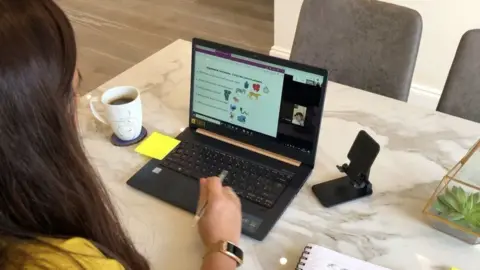 Shermeena Rabbi
Shermeena RabbiAs the therapists cannot do the physical aspects of the therapy online, they’ve had to delegate this to parents, who wouldn’t always have been present at sessions.
However, that has actually turned out to be something surprisingly empowering and beneficial, says Shermeena.
She is impressed at how effective the online therapy sessions have been. “For younger patients the digital screen is just part of normal life,” she says.
It’s also nice to see patients in their home setting and it cuts down on travel costs for everyone, she adds.
The speech therapists use apps such as WhatsApp, Google Meet and FaceTime.
They follow professional tele-health guidelines, a checklist that ensures things like good microphone quality and the ability to see clearly the patient’s face, including lips and mouth.
The team meets daily at 2.30pm for their own "fancy-a-cuppa" video call, when they chat and share knowledge.
The consensus is they will continue to offer this alternative service even when lockdown eases, and they will downsize their physical premises.
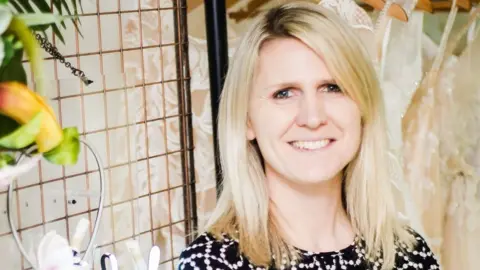 Anna Wood
Anna WoodAnna Wood, 40, runs her own bridal dress boutique in the village of Long Buckby, Northamptonshire.
She had previously run several online enterprises but always dreamed of owning her own business premises. She took a break from work to get married – and this proved to be her moment of epiphany.
“I never quite got the experience I wanted as a bride visiting boutiques, so I saw a gap in the market,” she remembers.
She wanted to specialise in brides who “feel overwhelmed by the process and need a helping hand on the journey”, she says.
She liked her chosen location – on the first floor above a bakery on the High Street - because her brides-to-be would feel they were visiting somewhere for a special appointment, but wouldn’t have to worry about passers-by looking through the window.
Her boutique opened in October 2018 and served nearly 100 brides before coronavirus struck.
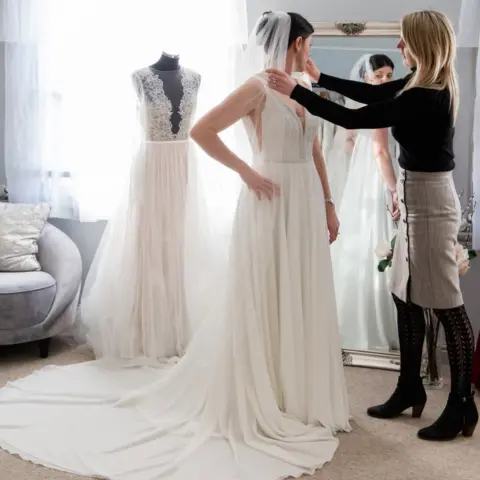 Anna Wood
Anna WoodAlthough Anna loves the space, lockdown has made her question things, and she is now thinking of phasing out the physical boutique once the lease runs out.
She says working with brides remotely during lockdown has been “strange to get used to”, but ultimately makes sense for her business, and not just by cutting costs on things like rent, business rates and utility bills.
She can discuss potential dresses with customers by video call, sending them pictures, then organise fittings at designers’ stores or the bride's home (as and when lockdown rules allow).
And lockdown has allowed her to focus on the part of the business she found most rewarding anyway - what she calls the bride coaching. “Not all brides go into marriage in a really happy place, some are quite anxious and have self-belief issues,” Anna says.
 Anna Wood
Anna WoodShe would usually do her pep talks in a separate part of the boutique - but she has found that this intimate part of the service can work surprisingly well online, in video calls.
People in the bridal industry have recognised for a long time that shopping was migrating online, but thought they would be immune because it is such a specialised, personalised service, says Anna.
But lockdown is making people realise you can get a satisfying personal service online too.
The new crop of brides in their 20s and early 30s in particular have grown up as digital natives, and are more than ready for this transition, she thinks.
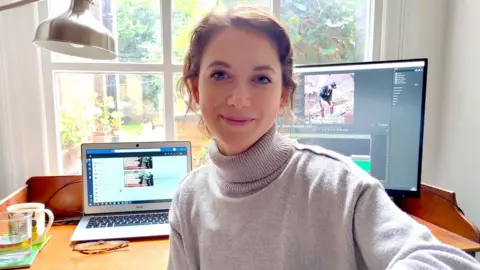 Annabel Sheen
Annabel SheenAnnabel Sheen, 30, joined the Imperial War Museum in London in April. The museum was closed to the public because of coronavirus.
Normally the building would have been the focus of her daily routine. Her role is to bring collections to life - her speciality is making digital exhibits.
“I haven't met any of my colleagues in person yet, I haven't even been given my staff pass,” she says.
Working at a museum is all about getting to know the physical space, the exhibits and the curators there, so lockdown has been a big challenge.
“Nearly everything I'm working on is new content that wasn't part of our team's plan a few months ago,” she adds.
For example, she has made this video - appropriately enough, in an age of Zoom calls - about British troops in the Far East sending recorded video messages to loved ones back home in 1945.
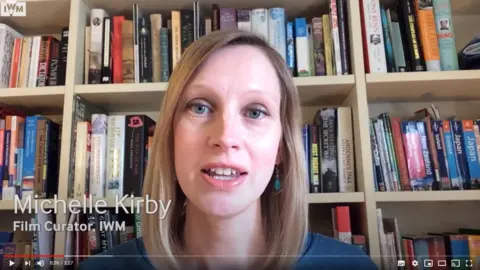 Imperial War Museum
Imperial War MuseumAccessing the archive video was not a problem, but interviewing the curator to add her expertise to the edit meant devising new work methods.
“We have to interview curators via [video platforms like] Teams and ask them to record themselves on their smartphone rather than using a camera and proper audio equipment as we usually would,” she says.
Although some bits had to be rejected in the edit, Annabel has been pleasantly surprised by the quality of work she’s been able to produce.
Public lectures that would have been conducted in the museum have migrated online as well, and she has to help with the live broadcast of those too.
She is looking forward to finally being able to meet her team in person when lockdown eases and the museum opens.
“For now," she says, "I'm just a pair of initials at the bottom of the screen in a big meeting.”
Have you had to get creative with your work in lockdown? You can contact business reporter Dougal Shaw
